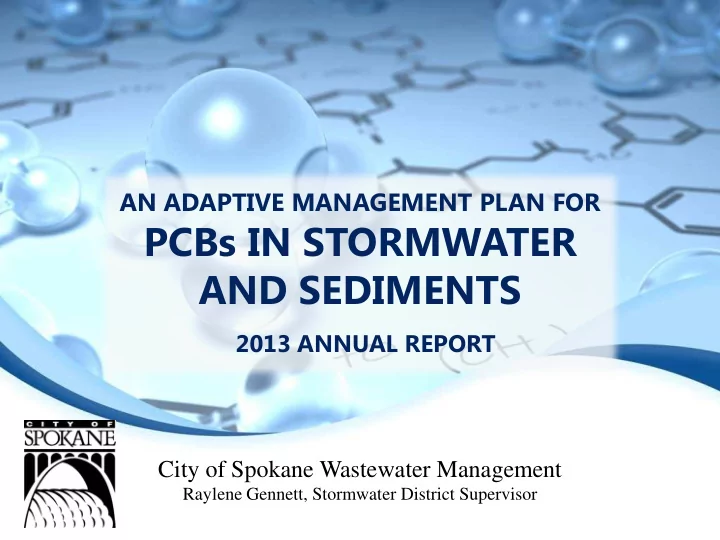

AN ADAPTIVE MANAGEMENT PLAN FOR PCBs IN STORMWATER AND SEDIMENTS 2013 ANNUAL REPORT City of Spokane Wastewater Management Raylene Gennett, Stormwater District Supervisor
Study Area
Stormwater Management in Spokane Pathway for PCBs to enter the Spokane River • MS4: Municipal Separate Storm Sewer System • CSO: Combined Sewer Overflow (less frequent) PCB Sample Locations
Adaptive Management Plan Reduce PCBs in stormwater discharges Analyze and interpret existing data 1. Identify likely sources of PCBs. Design and 2. implement remedial actions and BMPs. Adaptive approach – further data collection 3. and remedial action Phase I: remedial maintenance, sampling, analysis of existing information PCBs particulate bound: sample catch basin sediments •
Priority Investigation Areas Drywells 2012 Re-Sample MS4 CSO
Sampling Procedures • Composite samples ~ 10 CBs each group • Individual samples from 1 CB only • Four sediment samples per catch basin • Mix contents of each catch basin sample • Chain of custody procedures • Anatek: Method 8082 • Pacific Rim: Method 1668 • Decontaminate sampling equipment: DI water rinse Liquinox soap DI water acetone air dry foil wrap
Remedial Maintenance Review Aroclor analysis results Residential cleanup standard: 1.0 mg/kg Remove all sediments from catch basins Dump on separate pad, mix with sawdust Haul to lined cell at landfill
Curb Markers Install markers at each basin after cleaning Installation in progress throughout City on normal maintenance routes • Over 4,200 Installed
2010 and 2011 Sampling Recap Highest in HI Zone = 2012 Re- sampling
2010 and 2011 Sampling Recap 2010 Composite Samples • 432 Catch Basins – broken into 41 Groups in Union Basin and HI CSO 34 • 280,000 lbs sediments removed • 26 grams PCBs removed 2011 Composite Samples • 333 Catch Basins – 35 Groups in CSO 34 up-gradient (light industrial, commercial, residential) • 268,000 lbs sediments removed • 3.7 grams PCBs removed 2011 Individual Samples • Helped identify contaminated CB near City Parcel • Disconnected from MS4 • PCBs still found in 2010-cleaned CBs = continual PCB source in area
2012 Catch Basin Sampling Focused on 2010 Groups • Higher PCB concentrations than 2011 • Compare “apples to apples” • Preference: group composites • Individual testing if entire group can not be sampled (not enough sediment accumulation) • Help determine continual PCB sources 2012 Sampling: 39,600 lbs sediments 2.7 grams PCBs removed
2012 Catch Basin Sampling
Year-to-Year Comparisons Group 2010 2012 Concentration % Number Concentration (ug/kg) Reduction COMPOSITE (ug/kg) Group 1-C 754.0 464.0 38% Group 2-C 296.0 126.0 57% Group 8-C 115.0 87.9 24% Group 11-C 179.0 74.0 59% Group 12-C 731.0 612.0 16% Group Number 2011 Concentration 2012 % (ug/kg) Concentration Reduction INDIVIDUAL (ug/kg) Group 13-id-3 1185.0 767.0 35% Group 13-id-4 279.0 120.0 57% Group 13-id-11 5.0 5.6 -12% Group 24-id-10 103.0 69.4 33% Group 24-id-11 121.0 95.1 21% Group 25-id-1 115.0 93.9 18%
2012 Catch Basin Sampling “Hot Spots” Group 6 PCBs in ug/kg (ppb), Congener Analysis
2012 Catch Basin Sampling “Hot Spots” Group 13 PCBs in ug/kg (ppb), Congener Analysis
2012 Catch Basin Sampling “Hot Spots” Group 1 PCBs in ug/kg (ppb), Aroclor Analysis
Stormwater Sampling: 2012-2013
Stormwater Sampling Automatic composite samplers Depth Flow Rate Samples
Stormwater Sampling Location Range (pg/L or Notes ppq) Union Basin Outfall 13,700 – 48,900 Industrial Land Use Lee & Springfield 35,300 – 66,000 Industrial Land Use, just (below City Parcel site) below PCB cleanup site Cochran Basin 1,000 – 12,600 “Average” Spokane stormwater (large area of city) Washington Basin 4,000 – 8,800 Commercial/Residential CSO 34 No Data Yet Liberty Lake Study 500 – 8,400 Urban “background,” no (Ecology) known point source
Conclusions • Individual sources difficult to identify • Widespread, diffuse source of PCBs • Legacy sources from historic industrial activity • PCBs found in everyday items (motor oil, hydraulic fluid, etc.) • Investigating options for treatment and infiltration in Union basin (disconnect MS4 from river) • Integrated Plan: treat and infiltrate Cochran basin stormwater
Questions? More information: 2013 PCB Annual Report http://www.spokanewastewater.org/StormwaterDocs.aspx
Recommend
More recommend